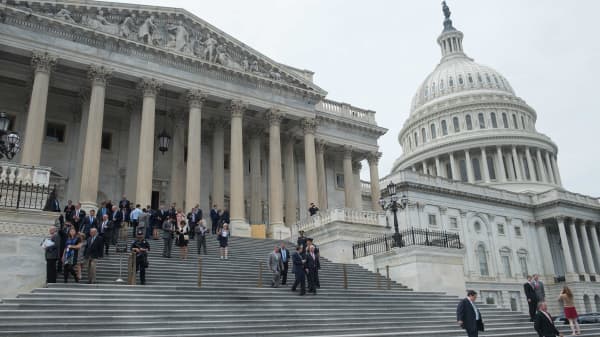The majority of state governments would take a multibillion-dollar hit under the latest Republican proposal to overhaul the nation's health-care system.
But the proposal saves the biggest pain for the mostly blue states that have expanded coverage for low-income households under the federally financed Medicaid program.
The latest analysis of the Senate bill, named for co-sponsors Sen. Lindsey Graham of South Carolina and Sen. Bill Cassidy of Louisiana, comes from the Kaiser Family Foundation, which estimated the impact of the proposed funding formula on each state.
The GOP proposal would represent a massive money shift from one group of states to another. Roughly two-thirds of the states would see a combined loss of more than a $250 billion between 2020 and 2026, according to the Kaiser analysis. At the same time, a third of the states would pick up nearly $70 billion in new funding during that four-year period.
The biggest losers by far would be California and New York, which would lose a combined $114 billion over four years, roughly half the total cuts. Both are heavily Democratic states that opted to expand Medicaid coverage under the Affordable Care Act.
The biggest winner could be Texas, a Republican state that did not expand Medicaid coverage, which would pick up more than $28 billion in new funding under the Graham Cassidy bill. The remaining funding gainers, including Georgia, Alabama, Mississippi, Tennessee, South Carolina, Missouri and Wisconsin, are largely red states.
The realignment would be generated by several provisions in the proposal, including a shift in funding from the current Medicaid reimbursement formula to a set of fixed block grants. The bill also caps the amount of federal Medicaid funding for the states and eliminates funding provided under the Affordable Care Act.
It remains to be seen whether the proposal can capture the 51 votes needed to win approval in the Senate. Democrats are uniformly opposed and a handful of GOP senators have expressed reservations about the bill.
Those GOP votes could turn on the funding formula that would leave several key states losers under the plan, including Arizona and Alaska. Sens. John McCain, R-Ariz., and Lisa Murkowski, R-Alaska, who voted against the last Senate health care overhaul bill have not come out in favor of the latest proposal.
However, two media reports on Thursday indicated that a new draft of the proposal contains certain sweeteners to try to win over Murkowski's vote.
Under the Graham Cassidy proposal, the federal health care block grants would expire in 10 years. Unless the program is renewed, federal health care funding would fall off a cliff in 2027, leaving every state with a shortfall and a combined funding gap of $240 billion.
WATCH: Cleveland Clinic CEO on Graham-Cassidy bill
CORRECTION: Sen. Lindsay Graham represents South Carolina. His home state was misstated in an earlier version of this article.




